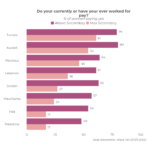Since the early 2010s, the global migrant crisis has led to the mass inflow of foreign migrants, refugees, and other displaced persons into numerous countries. Whereas some native citizens have welcomed these migrants, a large number have expressed opposition. Most theories explaining why citizens express opposition to migrants emerged from evidence collected in developed, European countries. Yet, developing, non-Western countries especially in the Middle East and North Africa (MENA) have borne the brunt of today’s migrant crisis. This study uses an original survey of 1500 citizens conducted in Morocco’s Casablanca-Settat region to explore how effectively traditional theories explain opposition to migrants amongst citizens of the MENA. Like those in many North African countries, Morocco’s migrants hail mostly from Arab countries (e.g. Syria, Iraq) or sub-Saharan African countries (e.g. Nigeria, Congo). We find the expected citizen opposition to migrants, but also that this opposition is more intense with respect to migrants from sub-Saharan Africa. While recent studies of Europe emphasize how cultural differences drive opposition to migrants, our results indicate that material issues—concerns about migrants’ negative effects on the economy and internal security—tend to motivate such attitudes in Morocco. Concerns about cultural conflicts and other immaterial differences play a smaller, secondary role.
View External SiteTopics
- Charity2
- Corruption113
- COVID-1969
- Democracy35
- Discrimination13
- Economy225
- Education51
- Environment36
- Extremism19
- Freedoms50
- Gender Issues159
- Governance253
- Health44
- International Relations192
- Labor Market34
- Media31
- Migration63
- Political Institutions213
- Political Participation33
- Political Systems60
- Refugees6
- Religion118
- Security31
- Social Justice44
- Wellbeing2
- Youth75


